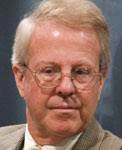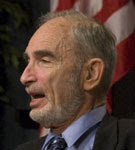-
United Nations Observes International Day for Preventing the Exploitation of the Environment in War and Armed Conflict
›November 6, 2008 // By Rachel Weisshaar Each November 6, the International Day for Preventing the Exploitation of the Environment in War and Armed Conflict passes by, largely unnoticed. But as the UN General Assembly noted in 2001 when it gave the day official status, “damage to the environment in times of armed conflict”—including poisoning of water supplies and agricultural land; habitat and crop destruction; and damage resulting from the use of biological, chemical, and nuclear weapons—“impairs ecosystems and natural resources long beyond beyond the period of conflict, and often extends beyond the limits of national territories and the present generation.”
Each November 6, the International Day for Preventing the Exploitation of the Environment in War and Armed Conflict passes by, largely unnoticed. But as the UN General Assembly noted in 2001 when it gave the day official status, “damage to the environment in times of armed conflict”—including poisoning of water supplies and agricultural land; habitat and crop destruction; and damage resulting from the use of biological, chemical, and nuclear weapons—“impairs ecosystems and natural resources long beyond beyond the period of conflict, and often extends beyond the limits of national territories and the present generation.”
In a written statement issued today, UN Secretary-General Ban Ki-moon points out that although natural resources are often exploited during war, they are also essential to establishing peace:The environment and natural resources are crucial in consolidating peace within and between war-torn societies. Several countries in the Great Lakes Region of Africa established trans-boundary cooperation to manage their shared natural resources. Lasting peace in Darfur will depend in part on resolving the underlying competition for water and fertile land. And there can be no durable peace in Afghanistan if the natural resources that sustain livelihoods and ecosystems are destroyed.
As the Development Gateway Foundation’s Environment and Development Community emphasizes, “[e]nvironmental security, both for reducing the threats of war, and in successfully rehabilitating a country following conflict, must no longer be viewed as a luxury but needs to be seen as a fundamental part of a long lasting peace policy.”
Some of the United Nations’ most important contributions to illuminating the links between conflict and environmental degradation are the excellent post-conflict environmental assessments that the UN Environment Programme’s (UNEP) Disasters and Conflicts Programme has carried out in Afghanistan, Lebanon, and Sudan, among other countries. UNEP is currently preparing to conduct an assessment of Rwanda’s environment.
Photo: A Kuwaiti oil field set afire by retreating Iraqi troops burns in the distance beyond an abandoned Iraqi tank following Operation Desert Storm. Courtesy of Flickr user Leitmotiv. -
Support Grows for Integrating Environment, Energy, Economy, Security in U.S. Government
›November 5, 2008 // By Rachel WeisshaarA new presidential administration always gives rise to a certain amount of bureaucratic restructuring. But for months now, momentum has been building behind the notion that governments need to improve the integration of their environmental, energy, economic, and security policies. Last month, Edward Miliband was named head of the UK government’s new department of energy and climate change. Last week, Canadian Prime Minister Stephen Harper tapped former industry minister Jim Prentice to lead a new ministry of environment, economy, and energy security. “I think that, as more and more countries are coming to realize, we cannot separate environmental and economic policy,” said Harper.
Yesterday, Grist’s David Roberts, noting that responsibility for addressing climate change is currently spread among the departments of State, Defense, Interior, Agriculture, Housing and Urban Development, Transportation, and Energy, offered several possibilities for restructuring the U.S. government to improve its ability to address climate change and energy, including creating a cabinet-level Secretary of Climate; expanding and empowering the Department of Energy or the Environmental Protection Agency; or—my favorite—appointing “some kind of czar,” because “[e]verybody loves a czar.”
Initiatives linking these challenges are popping up in Congress, universities, and the military. Senator Ken Salazar (D-CO) frequently speaks of the interrelated challenges of energy, environment, security, and economic growth “[O]ur addiction to foreign oil is a threat to our economic security, environmental security, and national security,” he said last year. The University of Colorado Law School recently established the Center for Energy and Environmental Security, which develops practical solutions to help move the world toward a sustainable energy future. In addition, the 2008 National Defense Strategy explicitly links energy, environment, and security: “Over the next twenty years physical pressures—population, resource, energy, climatic and environmental—could combine with rapid social, cultural, technological and geopolitical change to create greater uncertainty.”
A few small-scale initiatives to integrate environmental, economic, energy, and security policies within the U.S. government already exist. Yesterday, Carol Dumaine, deputy director for energy and environmental security at the Department of Energy, delivered a talk at the Harvard University Center for the Environment where she discussed a fledgling project to use unclassified data and a global network of experts in government, industry, and NGOs to identify interrelated environmental and energy security threats. Dumaine presented on the same project at a September 2008 conference on open-source intelligence sponsored by the Office of the Director of National Intelligence. It remains to be seen whether the Obama administration will continue this and other ongoing projects, or instead launch new projects of its own on these issues. -
PODCAST – Wouter Veening on Environment-Security Linkages
›October 29, 2008 // By Wilson Center StaffEnvironmentalists from around the world gathered in Barcelona from October 5-14, 2008, to discuss issues impacting a sustainable world at the World Conservation Congress. ECSP Director Geoff Dabelko interviewed Wouter Veening, co-founder and chairman of the Institute for Environmental Security (IES) in The Hague, following his discussion of “Environment and Security Challenges for Change.” In this podcast, Veening discusses the impact of climate change on traditional security threats and the global implications of failing to effectively address this issue. Dabelko analyzes related environment-security links in a chapter in IES’s Inventory on Environmental and Security Policies and Practices, as well as in numerous Grist dispatches from the IES 2004 Hague Conference on Environment, Security, and Sustainable Development. -
Close Quarters: Population-Climate Panel Draws Crowd at Society of Environmental Journalists’ Annual Conference
›October 23, 2008 // By Rachel WeisshaarAt “Close Quarters: Could an End to Population Growth Help Stabilize the Climate?,” the only panel on population at the annual Society for Environmental Journalists (SEJ) conference, Steve Curwood, host and executive producer of Public Radio International’s “Living On Earth,” pointed out that while it’s “something we don’t talk about at all in America,” U.S. population growth increases emissions faster than developing-country population growth, due to our larger per capita consumption. Curwood discussed the major connections between population and climate change, such as water use; food production and consumption; economic growth; and migration. Hypothesizing that climate change will lead to great demographic shifts not only in developing countries, but also in the United States, he noted that historically, “we haven’t dealt with them well.”
The panelists explored environmental reporters’ relative silence on the impact of population growth and other demographic dynamics on environmental issues. According to moderator Constance Holden of Science, the possible barriers to coverage—listed below—should be “irrelevant” to working journalists:- Population’s association with controversial issues like contraception;
- Fear of appearing anti-immigration;
- The widespread belief that population growth is necessary for economic growth; and
- The difficulty of researching and writing about the complex issues related to population and demographics.
Robert Engelman, vice president for programs at the Worldwatch Institute, criticized journalists for not delving into population’s significant, albeit complex, impacts on the environment. Reporters may wish to avoid writing about problems they believe have no easy solutions, but it is just as important for them to explore these thorny topics as more straightforward subjects, he said.
As an example of a potential story angle, Engelman displayed a graph showing that U.S. carbon emissions and population grew by the same percentage between 1990 and 2004. Yet when the data are disaggregated by state, they reveal a very different, surprisingly diverse picture. Some states’ populations and emissions increased roughly equally, but others, like Delaware, managed to decrease their emissions even while their populations grew. Engelman suggested that reporters could explore which factors had influenced the population-emissions relationship in their state.
Freelance writer Tom Horton explained how population growth has helped foil attempts to clean up the Chesapeake Bay. As he wrote recently in Growing! Growing! Gone! The Chesapeake Bay and the Myth of Endless Growth, “[I]t seems questioning the expansion of the economy and the population are off the table, either because they are considered sacred cows, or they are just too hard to deal with. It is assumed we can cure the symptoms while vigorously expanding their root causes.” In an interview following the panel, Horton lauded the efforts of integrated population-environment programs in the Philippines, saying Filipinos “are far more advanced than we are” in their understanding of the relationships between coastal management and population growth.
While “Close Quarters” was the only SEJ panel to directly address population, Dennis Dimick, executive editor of National Geographic Magazine, noted the importance of population in a panel he moderated on agriculture and climate change. In addition, keynote speaker Rajendra K. Pachauri, chair of the Intergovernmental Panel on Climate Change, briefly mentioned the opportunities presented by India’s youthful population and the “demographic dividend.” However, he did not use the opportunity to discuss global population growth’s implications for climate change. -
Dictionary of Global Environmental Governance Hits the Mark
›October 22, 2008 // By Rachel WeisshaarIf you’re not too daunted by its size (it tops out at just over 400 pages), the Dictionary & Introduction to Global Environmental Governance serves as a useful primer on international environmental politics and policies. This volume could be particularly useful to those working in related, but distinct, sectors who want to familiarize themselves with global environmental governance’s history and recent developments. Ever wondered what an epistemic community is? What makes water soft or hard? Curious to see the authors attempt to define “environment” and “ecology”? This book answers all these questions and many more, and most definitions are distinguished by admirable clarity and brevity. -
Weekly Reading
›In an open letter on water policy to the next U.S. president, Peter Gleick of the Pacific Institute urges the next presidential administration to develop a national water policy; highlight national security issues related to water; expand the United States’ role in addressing global water problems; and integrate climate change into all federal planning and activity on water.
A recent survey conducted by Liberia’s Truth and Reconciliation Commission found that land disputes are a key threat to peace in Liberia, reports BBC News.
Mikhail Gorbachev, former president of the former Soviet Union, called for a global glasnost, or openness, on environmental problems. “This financial turmoil, which will heavily affect the real economy, was absolutely predictable, and it is only one aspect of the wider crisis of all the current development systems,” said Gorbachev. “In fact, there are connected simultaneous crises that are rapidly emerging. These relate to energy, water, food, demography, climate change and the ecosystem devastation.”
The World Health Organization has developed a plan for research on the health impacts of climate change, reports the Science and Development Network. -
Dispatches From the World Conservation Congress: John Pielemeier
›October 7, 2008 // By John Pielemeier This has been quite an interesting first day at the World Conservation Congress Forum in Barcelona. Since I’m not a conservation expert (I’m here to participate on a panel on population, health, and environment programs), I’m enjoying the opportunity to view the conference a bit like an anthropologist. Here are a few observations from Day One:
This has been quite an interesting first day at the World Conservation Congress Forum in Barcelona. Since I’m not a conservation expert (I’m here to participate on a panel on population, health, and environment programs), I’m enjoying the opportunity to view the conference a bit like an anthropologist. Here are a few observations from Day One:
The conference has an interesting structure. In an effort to provide some organization for such a large conference (8,000 participants and 800 panels/events) there are three main “streams,” including “Healthy Environments, Healthy People”—the reason our panel was accepted—along with “A New Climate for Change” and “Safeguarding the Diversity of Life.” The participants are also encouraged to join one of 12 “journeys” (e.g., “Forests Journey,” “Species Journey”) to help bring them together for smaller meetings and social events. I found that I couldn’t get into the Forests Happy Hour this evening because I hadn’t signed up for the “Journey.” Some incentives do matter—if only I had known!
Despite the “healthy” headlines, very few panels discuss the relationships between human or animal health and the environment, and there are no health-related “journeys.” The one bright spot regarding interdisciplinary linkages thus far was an announcement by the Australian national parks director that he would host a major “Healthy Parks, Healthy People” meeting in 2010 where 50 percent of the attendees would be health professionals.
Some sessions are held in the Knowledge Café, a large room where folks join one of 12 round conversation tables based on special topics. The United Nations has funded a special program, called “Poble,” which has brought a significant number of indigenous people, in tribal headgear and colorful traditional dress, to the conference. The Poble meetings are in a large room with a low stage and no chairs; attendees sit or lie on the floor while listening to the presentations of their colleagues. The room has been full every time I have peered in.
Attendance seems to vary considerably among sessions. A Knowledge Café roundtable meeting on climate change attracted mid-career pros from the Global Environment Facility, the European Union, the United Nations, and scientific organizations, and the level of the unmoderated discussion was extremely high. Participants were well-informed about the issues facing the international community over the next few months, and were also familiar with the latest ideas regarding how to address climate change. On the other hand, a panel session on accountability in conservation programs and among environmental NGOs attracted only nine attendees who listened to four (good!) speakers. After tomorrow’s sessions, I’ll have an even better sense of which themes are attracting the attention of the conservation professionals here.
John Pielemeier is an international development consultant. During his 22-year career at the U.S. Agency for International Development (USAID), he served as USAID mission director in Brazil, USAID/Washington office director for South Asia, and as a special assistant in the office of the USAID administrator.
Photo courtesy of Heidi Fancher and the Woodrow Wilson Center. -
Paul Ehrlich: Human Technological Achievement Has Outpaced Ethical Evolution
›September 25, 2008 // By Rachel Weisshaar Human beings have harnessed culture and technology to become the most dominant animals on Earth, said Paul Ehrlich at a September 18, 2008, launch of his new Island Press book, The Dominant Animal: Human Evolution and the Environment, but “we’re really backward ethically—in terms of how we treat each other and…the environment. And this leads to a lot of problems, not the least of which is we’re destroying our life-support system.”
Human beings have harnessed culture and technology to become the most dominant animals on Earth, said Paul Ehrlich at a September 18, 2008, launch of his new Island Press book, The Dominant Animal: Human Evolution and the Environment, but “we’re really backward ethically—in terms of how we treat each other and…the environment. And this leads to a lot of problems, not the least of which is we’re destroying our life-support system.”
Showing posts from category environment.


 Each November 6, the International Day for Preventing the Exploitation of the Environment in War and Armed Conflict passes by, largely unnoticed. But as the UN General Assembly noted in 2001 when it gave the day official status, “damage to the environment in times of armed conflict”—including poisoning of water supplies and agricultural land; habitat and crop destruction; and damage resulting from the use of biological, chemical, and nuclear weapons—“
Each November 6, the International Day for Preventing the Exploitation of the Environment in War and Armed Conflict passes by, largely unnoticed. But as the UN General Assembly noted in 2001 when it gave the day official status, “damage to the environment in times of armed conflict”—including poisoning of water supplies and agricultural land; habitat and crop destruction; and damage resulting from the use of biological, chemical, and nuclear weapons—“ This has been quite an interesting first day at the
This has been quite an interesting first day at the  Human beings have harnessed culture and technology to become the most dominant animals on Earth, said Paul Ehrlich at a
Human beings have harnessed culture and technology to become the most dominant animals on Earth, said Paul Ehrlich at a 

